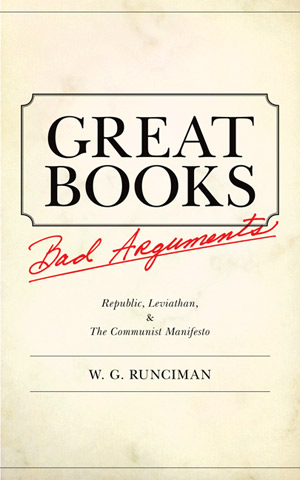
Great Books, Bad Arguments looks at three of the most famous texts in Western political thought and asks whether the proposals advanced by Plato, Hobbes, and Marx for the avoidance of disorder and injustice in human societies are sufficiently plausible, when analyzed sociologically, to carry conviction.
The conclusion I draw is that they are not. And that the problem which they accordingly pose is that of accounting for their enduring reputation as ‘great books.’
My suggested answer is that they should be read as masterpieces of what I call ‘optative’ sociology. By that I mean that Plato, Hobbes, and Marx want their readers to share not only their anger and dismay at what they see in the world around them but their passionate hope that a way can somehow be found to bring into being institutional arrangements whereby human beings can live together in harmony.
Many other commentators have pointed out what they see as weaknesses in Plato’s, Hobbes’s, and Marx’s arguments for their respective proposals. But none has gone on to account for how it is that proposals so demonstrably unrealistic can continue to command such universal and admiring attention.
“None has gone on to account for how it is that proposals so demonstrably unrealistic can continue to command such universal and admiring attention.”
That the concerns which Republic, Leviathan, and the Communist Manifesto address are of perennial importance is not in doubt. I first encountered the three books as a student more than fifty years ago, and it never crossed my mind to question why they were there on the reading lists.
But since then, I have pursued an academic career as a comparative and historical sociologist studying the range of political, ideological, and economic institutions which have evolved down the ages and across the world and the reasons for which they have or have not held together under different historical conditions. It is no surprise, therefore, that I should have reacted rather differently when reading the three books for the second time half a century later.
Sociology is not, and never will be, able to resolve Plato’s, Hobbes’s, and Marx’s concerns by laying down a political constitution which will guarantee internal peace. But over the last hundred years, the social sciences have made striking advances in our understanding of the institutional mechanisms and psychological dispositions which hold large societies of unrelated people together—despite the inherent conflicts of interest which always have, and always will, put different individuals and groups within their population into competition with one another for power.
It was that thought, and then a chance conversation with an eminent authority on Greek philosophy, which set me off to re-read first Republic, then Leviathan, and then The Communist Manifesto. This book is the result.
I would hope that potential readers who come across the book in their local or campus bookstore will either, having glanced at the opening pages, be sufficiently intrigued to glance at the concluding ones, or vice versa. Even a casual glance at either should be enough to make the potential reader aware that the book is deliberately intended to be provocative.
I have little doubt that there will be specialists in Platonic, Hobbesian, and Marxian studies who will regard some of my criticisms as exaggerated, misconceived, or fallacious. But I believe that the attempts to rebut my criticisms, whether successful or not, will in themselves contribute to the understanding of how and why the three texts have sustained their enduring reputation.
If, accordingly, there is a single aspect of the book on which I would like prospective readers to focus it is its combination of provocative questioning with underlying seriousness of purpose.
Republic, Leviathan, and The Communist Manifesto are great books. Their themes are as relevant in the 21st century world as they were in the worlds of Plato, Hobbes, or Marx. But that should not lead them to be exempted from criticism with the benefit of hindsight from a perspective inevitably different from their own.
“Plato, Hobbes, and Marx want their readers to share not only their anger and dismay at what they see in the world around them but their passionate hope that a way can somehow be found to bring into being institutional arrangements whereby human beings can live together in harmony.”
The significance of the book is proportionate to the significance of its implications for the questions of perennial interest and importance which Republic, Leviathan, and The Communist Manifesto address.
Plato was not wrong in thinking that intellectual reasoning can be applied to the enhancement of human wellbeing. Hobbes was not wrong in thinking that the protection afforded by the state imposes reciprocal obligations on the part of those it protects. Marx was not wrong in thinking that arrangements can be devised which will constrain the inequalities of power which arise from unregulated competition. I am at pains to make this much clear in my book.
I also draw particular attention to the work of Elinor Ostrom, who has been awarded a Nobel Prize since I wrote, as one of the outstanding contributions of recent behavioural science to Hobbes’s central preoccupation with the need, as he saw, for binding agreements to be underwritten by the sanction of force.
If my book can persuade readers both to look back at the three deservedly famous texts in the light of my comments—and thereby be prompted to catch up with the best of the recent sociological research which bears on the issues they raise,—it will have achieved its purpose.


W. G. (Garry) Runciman has been a Fellow of Trinity College, Cambridge since 1971. He holds honorary degrees from the Universities of Edinburgh, London, Oxford, and York. He is a Fellow of the British Academy and a Foreign Honorary Member of the American Academy of Arts and Sciences. Besides Great Books, Bad Arguments, featured in his Rorotoko interview, his other books include A Treatise on Social Theory, The Social Animal, and The Theory of Social and Cultural Selection.